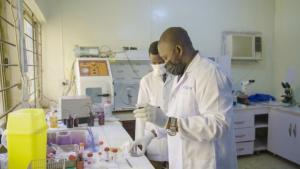Nigeria bolsters laboratory capacity for antimicrobial resistance towards Universal Health Coverage
Abuja, 28 March, 2022 - Imagine a world where medical treatment of routine ailments or operations become life-threatening and stop responding to drugs. The seemly far-fetched scenario is becoming real and a danger to medical interventions with the emergence of antimicrobial resistance (AMR).
In the case of Yomi Ade (not real name), a 21- years old who lives in Ile -Ife, Osun State, had to spend 87 days in the hospital after being diagnosed with blood sepsis because his aliment was not responding to any of the medication administered.
Being a sickle-cell patient, Mr Ade had hip surgery some months earlier but - recovered and went back to school. He later fell ill and was rushed home and taken to the Obafemi Awolowo University Teaching Hospital, Ile-Ife, Osun State, in South-West Nigeria, where he spent almost three months.
“I missed a semester and could not graduate with my classmates because I was in the hospital. My case was complex as it was not responding to almost all the antibiotics administered. The doctors were perplexed, and this affected me psychologically. It was so bad as there seemed to be no cure for the ailment”, he said.
“Yomi is not the only peculiar case of antibiotic resistance we have recorded in this hospital. We have had patients whos were also not responding to the first and second lines of antibiotics treatment options. The emerging threats have forced health care professionals to use reserved and more expensive antibiotics to combat the diseases”,Professor Oladipo Aboderin, a Consultant Clinical Microbiologist at the Obafemi Awolowo University Teaching Hospitals, Ile-Ife, Nigeria said.
Professor Aboderin said it has become essential for countries to address AMR for universal health coverage (UHC) strategy to be truly successful.
He said, “We thought AMR was a faceless threat to medical procedures and treatments. However, with recent happenings, there is a need for intentional and extensive research to understand the magnitude of the problem within society.
AMR in patients has unmeasurable consequences on the patients and their families, to mention a few it has emotional, financial, psychological and time-consuming effects. There is always huge out of pocket spending because the higher the generic prescribed, the more expensive and difficult it is to purchase. It defeats the goal of achieving universal health coverage”, he said.
Strengthening health system capacities
To achieve UHC globally, the World Health Organization (WHO) agrees that it is critical to address AMR by effectively strengthening the health care systems.
To this end, WHO has been supporting Nigeria to improve surveillance ( in 10 sentinel sites) and AMR stewardship (3 selected tertiary hospitals) in response to the WHO Global Action Plan on AMR.
Mr Omotayo Hamzat, WHO technical officer, said WHO is leading the Antimicrobial Stewardship in Nigeria and has supported NCDC to develop and implement the current National Action Plan.
According to him, bacteria spread freely in the environment, “But we are promoting a multi-disciplinary response to tackle AMR that includes human health, animal health, food production and the environment.
A Point Prevalence survey was conducted in the six geopolitical zones (one state in each zone), with the data analyzed and interpreted through technical assistance from WHO.
The results are being used to support three selected hospitals namely; Obafemi Awolowo University Teaching Hospital Ile-Ife Osun State, National Hospital Abuja and the Niger Delta University Teaching hospital Yenogoa, Bayelsa State, to institutionalize the Antimicrobial Stewardship programme in the hospitals.
Mr Hamzat said WHO supports the national One Health AMR surveillance systems by investing in human and animal health laboratories and promoting data sharing, analysis and joint action between human, animal, and environmental government ministries.
Meanwhile, Professor Aboderin said “The surveillance and stewardship support by WHO would support easy diagnosis and ensure responsible drug use in the country to mitigate the heaviest consequences of the spread of AMR.”
Globally, AMR is a threat to health and development. It requires urgent multisectoral action to achieve the Sustainable Development Goals. AMR occurs when bacteria, viruses, fungi and parasites change over time and no longer respond to medicines making infections harder to treat and increasing the risk of disease spread, severe illness and death. As a result of drug resistance, antibiotics and other antimicrobial medicines become ineffective, and infections become increasingly difficult or impossible to treat.
Technical Contact:
Mr Hamzat Omotayo, Email: hamzato [at] who.int (hamzato[at]who[dot]int)



